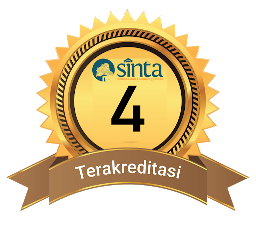Efektivitas Bahan Ajar Kesetimbangan Kimia Berbasis Kerja Ilmiah dan Pendekatan Scientific Terhadap Hasil Belajar
DOI:
10.29303/cep.v5i1.2862Published:
2022-05-30Issue:
Vol. 5 No. 1 (2022): Edisi MeiKeywords:
Bahan Ajar, kerja ilmiah, Pendekatan SaintifikArticles
Downloads
How to Cite
Abstract
Penelitian ini bertujuan untuk menguji keefektivitasan penggunaan bahan ajar kesetimbangan kimia dengan mengeksplisitkan kerja ilmiah berbasis pendekatan scientific terhadap hasil belajar siswa. Penelitian ini dilaksanakan secara daring (online) dan melibatkan 70 siswa pada salah satu SMA Negeri di Kabupaten Sampang, Jawa Timur. Instrumen yang digunakan untuk pengumpulan data berupa 10 soal pilihan ganda yang telah divalidasi secara empirik. Analisis data dilakukan menggunakan uji Anacova. Hasil penelitian ini menunjukan bahwa terdapat perbedaan hasil belajar pada materi kesetimbangan kimia terhadap siswa yang dibelajarkan menggunakan bahan ajar kesetimbangan kimia berbasis kerja dan pendekatan ilmiah (kelas eksperimen) dibandingkan siswa yang menggunakan bahan ajar regular (kelas kontrol). Perbedaan ini ditunjukan oleh hasil belajar kelas eksperimen (81,40) yang lebih tinggi dibandingkan hasil belajar kelas kontrol (67,48). Perbedaan ini selanjutnya dikonfirmasi oleh uji anacova dengan nilai signifikansi 0,000 < 0,05 yang mengindikasikan bahwa Bahan Ajar Kesetimbangan Kimia Berbasis Kerja dan Pendekatan Ilmiah (BA-KK-KPI) efektif dalam meningkatkan hasil belajar siswa.
References
Atikoh, N., & Prasetyo, Z. K. (2018). The Effect of Picture Storybook Based on Scientific Approach through Inquiry Method toward Student’s Inference Skill. Journal of Turkish Science Education, 15.
Avikasari, A., Rukayah, R., & Indriayu, M. (2018). The Influence of Science Literacy-Based Teaching Material Towards Science Achievement. International Journal of Evaluation and Research in Education (IJERE), 7(3), 182–187.
Bernal-Ballen, A., & Ladino-Ospina, Y. (2019). Assessment: A Suggested Strategy for Learning Chemical Equilibrium. In Education Sciences (Vol. 9, Issue 3).
Costa, S. L. R., Broietti, F. C. D., & Obara, C. E. (2021). Identifying Scientific Practices in a Science, Technology and Society Themed Workshop. Acta Didactica Napocensia, 14(2), 181–193.
Criasia, R. T., Lees, A. B., Mongelli, M. T., Shin, Y.-G. K., Stokes-Huby, H., & Vitale, D. E. (2009). Non-linear POGIL for Developing Cumulative Skills and Multidisciplinary Chemical Concepts for Non-science and Chemistry Majors BT - Chemistry Education in the ICT Age (M. Gupta-Bhowon, S. Jhaumeer-Laulloo, H. Li Kam Wah, & P. Ramasami (eds.); pp. 185–195). Springer Netherlands.
Dinihari, P., Effendy, Rahayu, S., & Dasna, I. W. (2020). The Impact of 4ERE Learning Cycle on Vocational Student Learning Motivation of Adaptive Chemistry Subjects. AIP Conference Proceedings, 2215, 060034.
Gültepe, N. (2021). Scientific Argumentation in Teaching Hydrogen Bonding. Science Education International, 32(3), 197–208.
Habiddin. (2013). Meningkatkan Keterampilan Dasar Mengajar Kimia Melalui Pembelajaran Berbasis Board Game (BGBL). Chimica Didactica Acta, 1(1), 7–17.
Komatsu, H., Rappleye, J., & Silova, I. (2021). Student-Centered Learning and Sustainability: Solution or Problem? Comparative Education Review, 65(1), 6–33.
Lutfi, A., & Nugroho, A. (2019). Minat Belajar dan Keberhasilan Belajar Partikel Penyusun Atom Dengan Media Pembelajaran Permainan Chem Man. J-PEK (Jurnal Pembelajaran Kimia), 4(1), 39–50.
Papp, T. A. (2020). A Canadian study of coming full circle to traditional Aboriginal pedagogy: a pedagogy for the 21st century. Diaspora, Indigenous, and Minority Education, 14(1), 25–42.
Putra, A. D., & Lutfi, A. (2021). Modul Berbasis Chemo Entrepreneurship Pada Materi Kimia dalam Kehidupan Sehari-hari untuk Anak Jalanan. Chemistry Education Practice, 4(1), 1–9.
Ulfa, R. F., Habiddin, H., & Utomo, Y. (2021). Interactive Instructional: Theoretical Perspective and Its Potential Support in Stimulating Students’ Higher Order Thinking Skills (HOTS). J-PEK (Jurnal Pembelajaran Kimia), 6(1), 1–8.
Yachina, N. P., Valeeva, L. A., & Sirazeeva, A. F. (2016). E-Teaching Materials as the Means to Improve Humanities Teaching Proficiency in the Context of Education Informatization. International Journal of Environmental and Science Education, 11(4), 433–442.
Yılmaz, E., & Korur, F. (2021). The Effects of an Online Teaching Material Integrated Methods on Students’ Science Achievement, Attitude and Retention. International Journal of Technology in Education, 4(1), 22–45.
Author Biographies
Syamyafiya Afiyanti, Universitas Negeri Malang
Habiddin Habiddin, Universitas Negeri Malang
Miftahul Jannah, Universitas Negeri Malang
License
Copyright (c) 2022 Syamyafiya Afiyanti, Habiddin Habiddin, Miftahul Jannah

This work is licensed under a Creative Commons Attribution-ShareAlike 4.0 International License.
Authors who publish with Chemistry Education Practice agree to the following terms:
- Authors retain copyright and grant the journal right of first publication with the work simultaneously licensed under a Creative Commons Attribution License 4.0 International License (CC-BY-SA License). This license allows authors to use all articles, data sets, graphics, and appendices in data mining applications, search engines, web sites, blogs, and other platforms by providing an appropriate reference. The journal allows the author(s) to hold the copyright without restrictions and will retain publishing rights without restrictions.
- Authors are able to enter into separate, additional contractual arrangements for the non-exclusive distribution of the journal's published version of the work (e.g., post it to an institutional repository or publish it in a book), with an acknowledgement of its initial publication in Chemistry Education Practice.
- Authors are permitted and encouraged to post their work online (e.g., in institutional repositories or on their website) prior to and during the submission process, as it can lead to productive exchanges, as well as earlier and greater citation of published work (See The Effect of Open Access).






